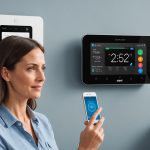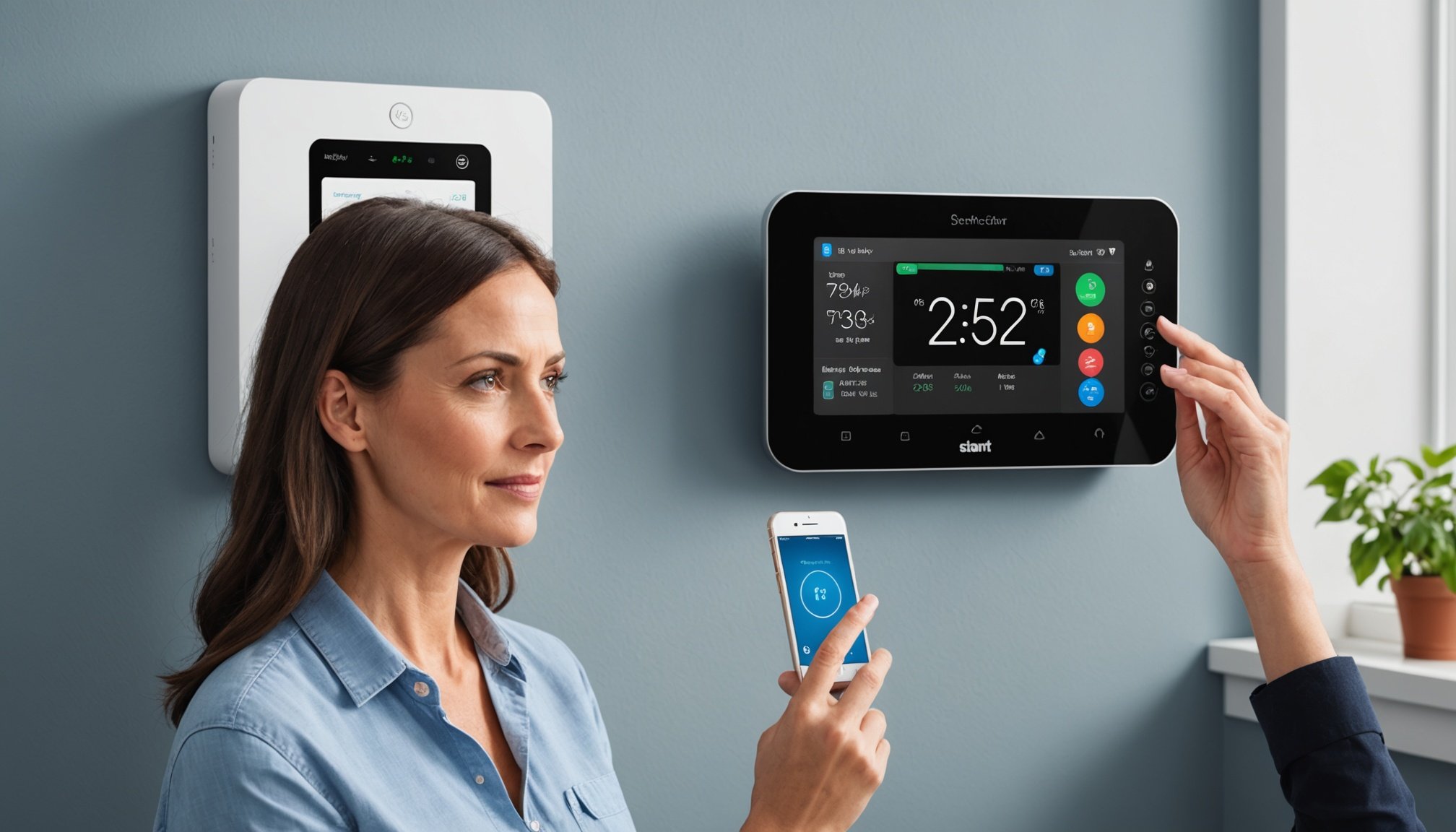Overview of Smart HVAC Systems
Smart HVAC Technology represents a new era in indoor climate control. This technology comprises advanced HVAC systems equipped with sensors, Wi-Fi connectivity, and automated programming capabilities. These components allow the system to intelligently manage ventilation, heating, and air conditioning, optimizing indoor environments in real time.
Indoor climate control is crucial for maintaining comfort and fostering a healthy living space. A well-monitored environment can significantly impact your well-being by controlling humidity levels and ensuring optimal air quality. Features like programmable thermostats and air quality sensors allow users to tailor their climate settings accurately.
In the same genre : Elevate Your Home’s Ambiance: Harness Advanced Smartphone Technology for Smart Lighting Mastery
Energy efficiency is a standout benefit of smart HVAC systems. By constantly monitoring and adjusting to environmental changes, these systems reduce energy consumption. They can dynamically lower the heating or cooling output when a space is unoccupied, thereby cutting down on costs.
Energy efficiency also contributes to environmental sustainability. By consuming less energy and utilizing renewable resources when available, smart HVAC systems promote eco-friendly solutions. This can ultimately lead to savings on energy bills and a reduced carbon footprint.
Also read : Revamp Your Home: Use Your Smartphone to Create an Innovative Tech-Driven Fitness Area
In summary, smart HVAC systems provide a comprehensive solution for improved living comfort, energy efficiency, and environmental impact, making them an ideal choice for modern homes.
Key Features of Smart HVAC Technology
The smart features of HVAC systems bring remarkable advancements in HVAC monitoring and remote management. These systems incorporate sensors and connectivity options allowing real-time supervision of indoor air quality and temperature. Users can access and control their HVAC systems remotely through dedicated apps or smart home hubs such as Amazon Alexa or Google Home, ensuring their environment is always optimal, even when they’re away from home.
With real-time monitoring, smart HVAC systems provide immediate feedback on indoor conditions, enabling adjustments to be made promptly. This dynamic interaction ensures that systems maintain the desired comfort level efficiently and alert users to potential issues before they escalate.
Integration with smart home ecosystems broadens the appeal and functionality of smart HVAC. Seamless connections with existing smart home devices enhance user experience, creating a cohesive and intuitive home management system. Notably, smart thermostats can be included in voice command setups, allowing users to verbally adjust settings.
Overall, the key features of smart HVAC technology, such as enhanced monitoring capabilities and remote management, significantly improve both comfort and control in modern homes. Smart system integration facilitates energy savings and environmental benefits, aligning with the sustainable living trend.
Product Reviews of Popular Smart HVAC Systems
Exploring smart HVAC systems can be overwhelming due to the plethora of options available in the market. When examining smart thermostats, it’s important to consider how they rank in terms of technology, ease of use, and cost efficiency. Among the top picks, brands like Nest, Ecobee, and Honeywell consistently receive positive reviews for their intuitive interfaces and robust features.
Review of Major Brands
- Nest: Known for its sleek design and advanced learning capabilities, it adapts to user preferences efficiently.
- Ecobee: Offers remote sensors that enhance comfort by monitoring different areas, promoting balanced climate control.
- Honeywell: Provides user-friendly installation with comprehensive compatibility with existing systems.
Comparison of Features
Each of these brands integrates capabilities such as energy savings and adaptive learning. Nest focuses on automation, while Ecobee emphasizes room-specific management, ensuring energy is utilized where needed. Honeywell delivers seamless integration with smart home ecosystems like Alexa, using voice commands or smartphone apps for remote management.
Price Range and Value
Smart HVAC systems vary significantly in price, necessitating an evaluation of cost-effectiveness. While higher initial costs might seem daunting, long-term ROI justifies the investment through lower energy expenses and enhanced home value.
Installation Guide for Smart HVAC Solutions
Setting up a smart HVAC system can be a rewarding venture, boosting both home efficiency and comfort. Before embarking on this journey, gather essential tools, including screwdrivers, wire strippers, and a voltage tester. Depending on your system choice, the installation may demand basic electrical knowledge or necessitate professional assistance.
DIY Installation Process
For homeowners opting for a DIY installation, it’s crucial to turn off power to the HVAC system at the breaker box. Begin with mounting the smart thermostat and connecting it to existing HVAC wires. Refer to the thermostat’s manual for correct wiring instructions. Once secured, use associated apps for configuring and syncing with your smart devices.
Professional Installation
For those who prefer stress-free implementation or face complex systems, hiring a professional installer is advisable. They possess the expertise to ensure a seamless setup without the risk of errors, ensuring all components are functioning properly.
Troubleshooting Tips
Common pitfalls include incorrect wiring or connectivity issues. Double-check connections and ensure Wi-Fi compatibility. If challenges persist, consult customer support or seek professional advice. By addressing these carefully, you can harness the full potential of your smart HVAC system while avoiding unnecessary hassles.
Maximizing Indoor Comfort with Smart HVAC
Achieving optimal indoor comfort with smart HVAC is attainable with strategic adjustments and technology use. Setting up well-defined temperature zones ensures that each area satisfies its unique climate needs. Enhancing energy optimization is possible by incorporating programmable scheduling features, enabling the system to adapt to user routines and preferences. Scheduled temperature adjustments not only maintain comfort but also contribute to energy savings by avoiding unnecessary heating or cooling.
To further bolster efficiency and maximize comfort, integrate your smart HVAC system with other smart home devices. For instance, smart blinds can automatically close during peak sun hours to reduce heat, working in tandem with the HVAC system to maintain a cooler atmosphere. Similarly, using air purifiers in conjunction with smart thermostats can improve air quality while keeping energy use efficient.
Tech enthusiasts should explore smart home hubs like Alexa or Google Home, which can seamlessly control various devices under a unified ecosystem. This integration ensures that energy conservation expands beyond just the HVAC system, encompassing a whole-home approach to efficiency and comfort.
By implementing these techniques, homeowners can enjoy a balanced, comfortable indoor environment while minimizing their carbon footprint and enhancing energy efficiency.
Benefits of Smart HVAC Systems
Embracing a smart HVAC system comes with a host of compelling benefits, particularly in terms of long-term energy savings. These systems significantly reduce energy consumption by optimizing heating and cooling based on occupancy and real-time environmental changes. This efficiency directly translates into substantial cost savings on energy bills, offering an attractive return on investment for homeowners.
The environmental impact of energy-efficient smart HVAC systems is equally noteworthy. By minimizing energy waste and integrating with renewable energy sources when possible, these systems contribute to a reduced carbon footprint. This eco-friendly approach not only aids in preserving the environment but also improves a home’s overall appeal, making it more marketable in the real estate sector.
Furthermore, the adoption of smart HVAC solutions enhances home value. Properties equipped with advanced HVAC technology tend to attract more interest due to their potential for lower running costs and sustainable living. As energy efficiency becomes a priority for many, homes with smart HVAC systems are increasingly seen as desirable investments.
In essence, the advantages of smart HVAC systems are multifaceted, encompassing financial savings, environmental stewardship, and enhanced property value, all of which align with contemporary priorities for a more sustainable and economically savvy lifestyle.
Future Trends in Smart HVAC Technology
The future of HVAC systems is being reshaped by cutting-edge innovations in smart technology. Emerging solutions influenced by the Internet of Things (IoT) open pathways for devices to communicate seamlessly, enhancing efficiency and user experience. This interconnected approach allows systems to adjust to environmental changes with minimal human input.
Artificial Intelligence (AI) and machine learning are pivotal in HVAC management, offering predictive maintenance and optimization. These technologies enable systems to learn from historical data, predict failures, and suggest energy-efficient settings, effectively reducing downtime and maintenance costs. The integration of AI fosters adaptability, as systems proactively manage climate controls to ensure optimal performance.
Additionally, the integration with renewable energy sources is anticipated to accelerate. Smart HVAC systems are expected to sync with smart grids, optimizing energy usage in line with availability and cost-effectiveness. This shift will not only enhance environmental sustainability but also provide consumers with more control over their energy consumption and costs.
In anticipation of these developments, current homeowners and potential buyers might benefit from investing in smart HVAC systems, aligning their homes with these forward-thinking trends. With technological advances leading the charge, the HVAC industry is poised for a future that prioritizes energy efficiency, cost savings, and environmental responsibility.











